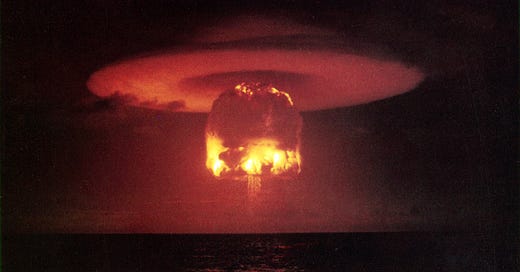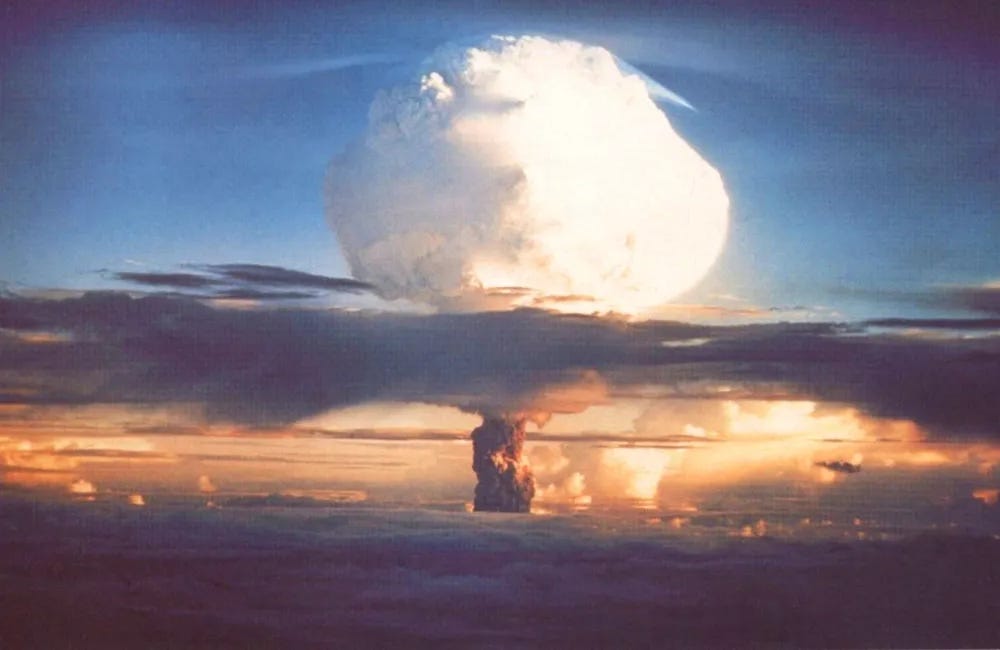Don't Forget: In 2018, Donald Trump Wanted to Make It Easier To Wage Nuclear War
He's no more stable six years later
This story originally appeared in Vice in 2018.
With today’s nuclear weapons, there are pretty much no options for U.S. leaders to wage a “small” atomic war. You either end the world or you don't. In concept, that all-or-nothing proposition makes nuclear conflict less likely.
But Pres. Donald Trump wants more weapons with small yields, which would in theory give military planners more options for waging a “limited” nuclear war that, while unimaginably destructive, would presumably stop short of completely wiping out human civilization.
The Trump administration reportedly also wants to loosen the rules for using them. Together, the twin policies could raise the risk of catastrophic atomic war, some experts warn.
The smaller nukes and looser rules are being codified as part of the administration’s ongoing Nuclear Posture Review, a formal study of America’s atomic arsenal and strategy that presidents traditionally oversee at least once in their years in office. The administration could make the review public soon, according to news reports citing congressional and diplomatic sources.
Former president Barack Obama’s nuclear review, from 2010, stated that the United States would only use nukes “in extreme circumstances.” Obama also championed a wide range of new and improved atomic warheads, plus missiles, bombers and submarines to carry them.
But the Obama administration maintained the power of the country’s 4,000 existing warheads, most of which have explosive yields equivalent to hundreds of kilotons of TNT. The exceptions include the W80 missile warhead and B61 bomb, both of which can be “dialed down” for lower yields. The lowest-yield setting on the B61 is reportedly equivalent to less than half a kiloton of TNT.
Building a larger arsenal of smaller nukes could have dangerous consequences, according to Bruce Blair, a nuclear expert at Princeton University. “President Trump may come to think that nuclear weapons are more usable if their warheads are smaller in explosive power,” Blair told me.
Equally worrying, Trump’s nuclear review broadens America’s nuclear rules of engagement. Before, it was U.S. policy that only a nuclear sneak attack or some other existential threat would justify a retaliatory atomic strike from the United States. By contrast, Trump's nuclear review reportedly warns that a major hacking event or an online assault on U.S. financial infrastructure could warrant a nuclear counterattack.
“The risk is that he will be quicker to order their use in a confrontation with Russia, China, North Korea or Iran and that the conflict will escalate to all-out nuclear war,” Blair said.
Jeffrey Lewis, a nuclear expert at Middlebury Institute of International Studies in California, told me he disagrees somewhat with the sentiment Blair expressed. “I think it’s a dumb idea, but not a particularly dangerous one,” Lewis said of smaller nukes.
“The reason I say this is that reducing the yield doesn’t make it any easier to use a nuclear weapon. In that sense, it is no more credible than the existing nuclear weapons in our stockpile—some of which, like the W80 and B61, already have variable yields with very low settings.”
“We haven’t used nuclear weapons since 1945 because there are enormous political downsides to doing so,” Lewis added. “As a practical matter, I don’t think there will ever be a scenario in which using nuclear weapons will be an appealing option for a sane U.S. policymaker.”
The efforts to build, and develop rules for using lower-yield nuclear weapons reflects “wishful thinking” by leaders and military planners, Lewis said. Advocates of small nukes “imagine that there is some technical solution to what is an impossible political problem.”
A nuke is a nuke is a nuke, in Lewis’s conception. There are no truly small ones. By extension, there are no limited nuclear wars, and American leaders will be as loath to actually use Trump’s smaller nukes as they were to use Obama’s bigger ones.
But there’s an important qualifier in Lewis’s description of nuclear-averse American policymakers. And that’s the word “sane.”
Read more:
This Nuke Expert's Terrifying Novel Is the Warning We Need Right Now
This story originally appeared in Vice in 2018. In November 1983, ABC ran The Day After, a shockingly realistic made-for-T.V. movie about the effects of nuclear war on a town in Kansas. For decades it was the most-watched broadcast in television history. Then-president Ronald Reagan said the film “greatly depressed” him and he…






